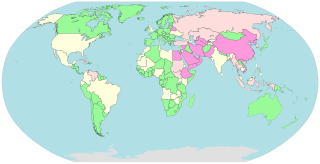Telecommunications in Belarus involves the availability and use of electronic devices and services, such as the telephone, television, radio or computer, for the purpose of communication.

Central Europe is the region comprising the central part of Europe. It is said to occupy continuous territory that are otherwise conventionally Western Europe, Southern Europe, and Eastern Europe. The concept of Central Europe is based on a common historical, social and cultural identity. Central Europe is going through a phase of "strategic awakening", with initiatives such as the CEI, Centrope and the Visegrád Four. While the region's economy shows high disparities with regard to income, all Central European countries are listed by the Human Development Index as very highly developed.

Telecommunications in Ghana include radio, television, fixed and mobile telephones, and the Internet.
Freedom of the press or freedom of the media is the principle that communication and expression through various media, including printed and electronic media, especially published materials, should be considered a right to be exercised freely. Such freedom implies the absence of interference from an overreaching state; its preservation may be sought through constitutional or other legal protections.
Statistics in the European Union are collected by Eurostat.

Ambika Soni is an Indian politician belonging to Indian National Congress. She had served as Minister of Information and Broadcasting. She is a Member of Parliament representing the state of Punjab in the Rajya Sabha.
Freedom of the press in the United States is legally protected by the First Amendment to the United States Constitution. This amendment is generally understood to prevent the government from interfering with the distribution of information and opinions.

After adaptation of Constitution of the Republic of Azerbaijan (1995), new legislative acts and amendments were issued in line with democratic principles and in consistency with requirements of international law within the legal reforms in Azerbaijan. Generally, there are 48 Articles regarding principal human and Civil Rights and Freedoms in the Constitution of Azerbaijan. In particular, section 3 of the Constitution establishes the major rights and freedoms of citizens of Azerbaijan, including human rights, property rights, equality rights, intellectual property rights, civil rights, the rights of the accused, the right to strike, social security, the right to vote and freedom of speech, conscience and thought.

The Press Freedom Index is an annual ranking of countries compiled and published by Reporters Without Borders based upon the organisation's own assessment of the countries' press freedom records in the previous year. It intends to reflect the degree of freedom that journalists, news organisations, and netizens have in each country, and the efforts made by authorities to respect this freedom. Reporters Without Borders is careful to note that the index only deals with press freedom and does not measure the quality of journalism nor does it look at human rights violations in general.

The media of Israel refers to print, broadcast and online media available in the State of Israel. The country boasts dozens of newspapers, magazines, and radio stations, which play an important role by the press in political, social and cultural life and cater it to a modern, developed and literate society.
Since 1991 Estonia has changed from being a former Soviet republic to a member of the European Union and the European Monetary Union, making a rapid transformation in several fields, including the media, which is a vibrant and competitive sector. For many years Estonia has been among the top ten in Reporters Without Borders’(RSF) Press Freedom Index. In 2017 it has been ranked 12th out of 180 countries by RSF while Freedom House assigned Estonia’s press freedom a score of 16/100. A cross-media landscape that embraces traditional media as well as the Internet and digital media characterises the contemporary media system in Estonia.
Latvia is one of the three post-Soviet Baltic states having regained independence in 1991 and since 2004 is a member State of the European Union. After its independence there have been fundamental changes of political, economic and social nature that have turned Latvia into a democratic country with a free-market economy. This reflects on the media landscape which is considered well-developed despite being subjected to a limited market and a linguistic and cultural split between Latvian (58,2%) and Russian speakers (37,5%). In 2017 Freedom House defined Latvia’s press freedom status as “free", assigning to the country's press freedom a score of 26/100. The 2017 World Press Freedom Index prepared annually by Reporters Without Borders (RSF) states that media in Latvia have a "two-speed freedom", underlying different levels of freedom for Latvian-language and Russian-language media. According to RSF's Index the country is ranked 28th among 180 countries.
In Slovakia, political information is disseminated through the mass media: television, radio, the press, and the internet. The public is becoming increasingly reliant on the internet for news, with television and the press becoming less important as news sources.

Freedom of speech is a principle that supports the freedom of an individual or a community to articulate their opinions and ideas without fear of retaliation, censorship, or legal sanction. The term "freedom of expression" is sometimes used synonymously but includes any act of seeking, receiving, and imparting information or ideas, regardless of the medium used.

Ukraine is in 102nd place out of 180 countries listed in the 2017 World Press Freedom Index. Organizations like Reporters Without Borders, Human Rights Watch and Committee to Protect Journalists have condemned Poroshenko government recent bans on media.

This list of Internet censorship and surveillance by country provides information on the types and levels of Internet censorship and surveillance that is occurring in countries around the world.

Crime in Hungary is combated by the Hungarian police and other agencies.
The Maldives ranks from the middle to the top third of international indexes of press freedom, indicating a large degree of freedom. Media discussion of religion, however, remains tightly restricted.
Media in Zambia consist of several different types of communications media: television, radio, cinema, newspapers, magazines, and Internet-based Web sites. The Ministry of Information, Broadcasting Services and Tourism is in charge of the Zambian News Agency which was founded in 1969.
The Media of the Czech Republic refers to mass communication methods through broadcasting, publishing, and the Internet.















